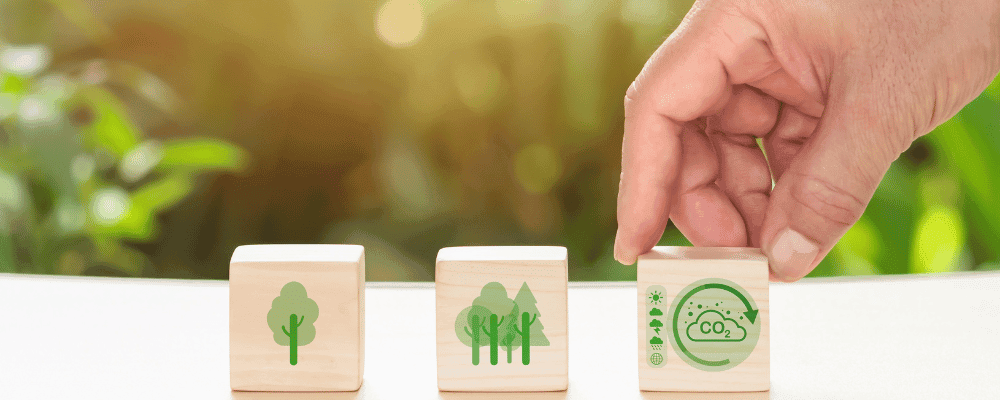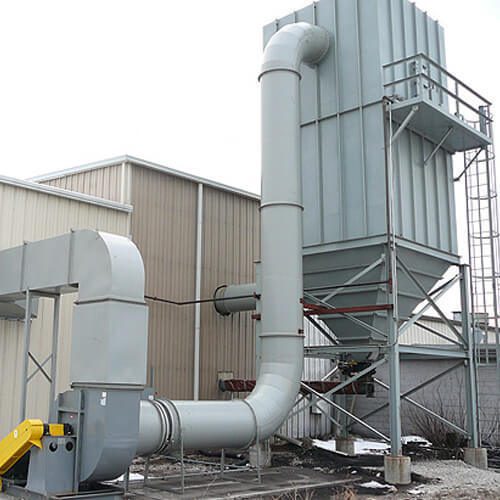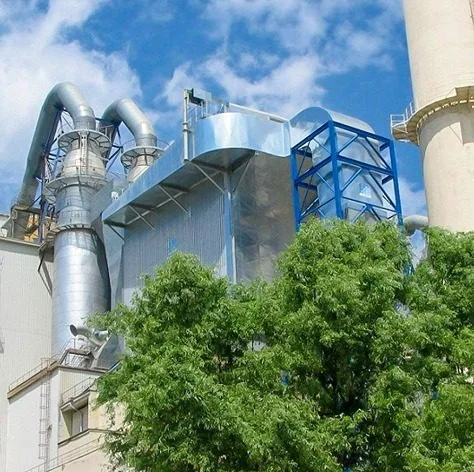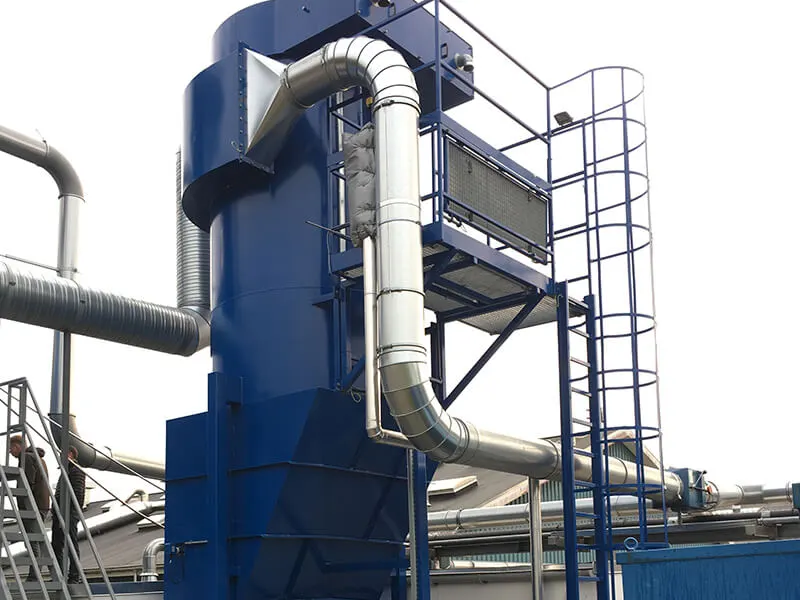Habang ang mga pandaigdigang industriya ay naghahangad na bawasan ang kanilang epekto sa kapaligiran, ang pagpapanatili ay naging isang pangunahing pokus sa iba't ibang sektor, kabilang ang pagsasala ng hangin. Ayon sa kaugalian, ang mga pang-industriya na sistema ng pagsasala ng hangin ay pangunahing idinisenyo para sa kahusayan sa pag-alis ng mga pollutant; gayunpaman, sa tumataas na mga hamon sa kapaligiran, mayroon na ngayong agarang pangangailangan para sa napapanatiling mga inobasyon na hindi lamang nagpapadalisay sa hangin ngunit nagpapababa din sa ekolohikal na bakas ng proseso ng pagsasala mismo.
Ine-explore ng blog na ito kung paano binabago ng mga advancement sa eco-friendly na materyales, disenyong matipid sa enerhiya, at recyclable na bahagi ang air filtration. Iha-highlight din namin kung paano hinihimok ng Intensiv-Filter Himenviro ang mga napapanatiling pagbabagong ito kasama ng mga makabagong solusyon nito na umaayon sa mga pandaigdigang sustainability initiative.
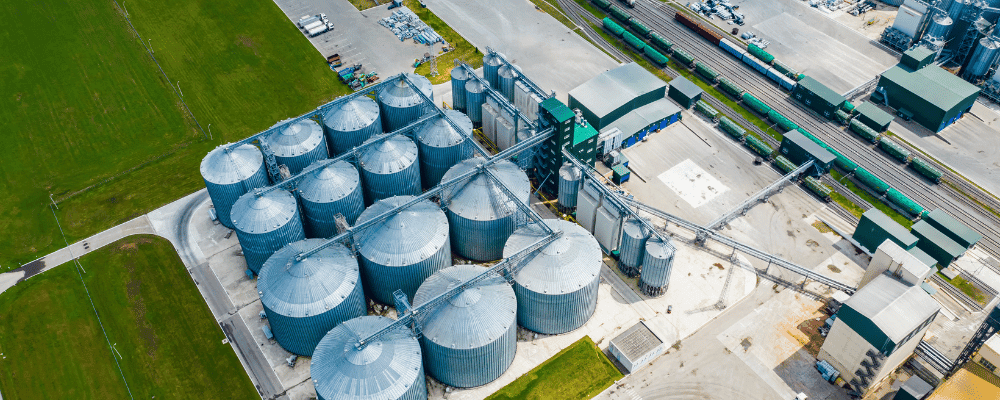
Tuklasin ang Aming Saklaw ng Mga Solusyon:
Isang Pagbabago Tungo sa Sustainable Air Filtration
Bakit Mahalaga ang Sustainability sa Air Filtration
Ang mga sistema ng pagsasala ng hangin, lalo na sa mabibigat na industriya tulad ng pagmamanupaktura, pagbuo ng kuryente, at pagpoproseso ng kemikal, ay gumaganap ng isang kritikal na papel sa pagbabawas ng mga pollutant sa hangin. Gayunpaman, ang mga tradisyunal na sistema ng pagsasala ay kadalasang umaasa sa mga hindi nare-recycle na bahagi, mga prosesong masinsinang enerhiya, at mga sintetikong filter na materyales na maaaring mag-ambag sa pagkasira ng kapaligiran. Sa pamamagitan ng pagtanggap ng mga napapanatiling kasanayan, maaaring bawasan ng industriya ng pagsasala ng hangin ang kabuuang carbon footprint nito, bawasan ang basura, at suportahan ang mas malawak na layunin sa kapaligiran.
Sa pagtaas ng mga regulasyon at presyon ng lipunan para sa mga eco-friendly na kasanayan, inuuna ng mga industriya ang mga sustainable air filtration solution na nagbibigay-diin sa:
- Biodegradable at biocompatible na materyales para sa filter na media.
- Mga disenyong matipid sa enerhiya na nagpapababa ng pagkonsumo ng kuryente.
- Recyclable at magagamit muli mga bahagi para sa pagliit ng basura.
Ang Mga Benepisyo ng Mga Luntiang Materyal at Proseso
Ang pagsasama ng mga napapanatiling materyales at proseso sa mga sistema ng pagsasala ng hangin ay nag-aalok ng maraming benepisyo, kabilang ang:
- Nabawasan ang Epekto sa Kapaligiran: Ang mga eco-friendly na materyales ay nagpapaliit ng basura at polusyon, na sumusuporta sa mas malusog na ecosystem.
- Mas mababang mga gastos sa pagpapatakbo: Binabawasan ng mga disenyong matipid sa enerhiya ang paggamit ng kuryente, binabawasan ang mga gastos sa pagpapatakbo.
- Pinahusay na Pagsunod: Maraming sustainable air filtration practices ang tumutulong sa mga industriya na matugunan o lumampas sa lalong mahigpit na mga regulasyon sa kapaligiran.
Kumonekta sa amin Ngayon
Mga Pangunahing Inobasyon sa Sustainable Air Filtration
1. Eco-Friendly na Filter Media
Ang isa sa mga pinaka-maimpluwensyang lugar ng pagbabago sa pagsasala ng hangin ay ang pagbuo ng biodegradable at biocompatible na filter media. Ang mga tradisyonal na sintetikong materyales, bagama't epektibo, ay kadalasang nagdudulot ng mga hamon sa pagtatapon dahil sa kanilang hindi nabubulok na kalikasan. Ang mga opsyon sa media na pang-filter na eco-friendly ay idinisenyo na ngayon mula sa mga materyales tulad ng mga natural fibers, biodegradable polymers, at maging ang mga by-product ng agrikultura, na nagbibigay ng epektibong pagsasala na may mas mababang environmental footprint.
- Biodegradable Polymers: Ang mga polymer na nagmula sa mga nababagong mapagkukunan tulad ng cornstarch o cellulose ay nag-aalok ng tibay para sa mga pang-industriya na aplikasyon habang ligtas na nabubulok pagkatapos itapon.
- Mga Likas na Hibla: Ang abaka, kawayan, at cotton ay lalong ginagamit sa paggawa ng filter na media na parehong epektibo sa pagkuha ng particle at biodegradable, na nag-aalis ng pangmatagalang basura.
2. Mga Disenyo ng System na Matipid sa Enerhiya
Ang kahusayan sa enerhiya ay isang mahalagang aspeto ng pagpapanatili sa mga pang-industriyang operasyon, at ang mga sistema ng pagsasala ng hangin ay walang pagbubukod. Ang mga pag-unlad sa mga disenyo ng sistema ng pagsasala ay nakatuon sa pagbabawas ng pagkonsumo ng enerhiya sa pamamagitan ng na-optimize na airflow, mga smart control system, at mga filter na mababa ang resistensya na nangangailangan ng mas kaunting kapangyarihan upang gumana.
- Mga Na-optimize na Disenyo ng Airflow: Sa pamamagitan ng pagpapabuti ng daanan ng airflow sa loob ng filtration unit, ang mga system ay maaaring gumana nang may mas mababang resistensya, na nagreresulta sa mas kaunting pagkonsumo ng enerhiya.
- Mga Smart Control System: Ang mga advanced na teknolohiya ng kontrol na nagsasaayos ng mga rate ng pagsasala batay sa real-time na data ng kalidad ng hangin ay nagbibigay-daan para sa adaptive na paggamit ng enerhiya, na binabawasan ang basura.
- Mga Filter na Mababang Paglaban: Ang mga filter na nag-aalok ng mas mababang airflow resistance ay binabawasan ang kabuuang enerhiya na kinakailangan para sa operasyon habang pinapanatili ang mataas na pagganap ng pagsasala.
3. Recyclable at Modular na Mga Bahagi
Upang matugunan ang mga hamon ng pagtatapon at pamamahala ng basura, maraming mga tagagawa ang nagsasama na ngayon ng mga recyclable na bahagi sa kanilang mga sistema ng pagsasala. Ang mga modular na disenyo ay nagpapahintulot din sa mga bahagi na madaling mapalitan o ma-upgrade, na nagpapahaba ng habang-buhay ng system at binabawasan ang pangangailangan para sa kumpletong pagpapalit.
- Mga Recyclable na Filter Housing: Sa pamamagitan ng paggawa ng mga filter housing mula sa mga recyclable na metal o plastik, maaaring mabawasan ng mga air filtration system ang basura habang pinapanatili ang tibay.
- Mga Modular na Bahagi: Ang mga modular na disenyo ay nagbibigay-daan sa mga industriya na palitan lamang ang mga partikular na bahagi ng sistema ng pagsasala sa halip na itapon ang buong yunit, na nagsusulong ng isang pabilog na diskarte sa ekonomiya.
4. Mga Reusable na Filter at Regenerative System
Ang isa pang makabuluhang pag-unlad ay ang paggamit ng mga reusable na filter at regenerative filtration system na maaaring linisin at muling gamitin nang maraming beses. Ang diskarte na ito ay lubos na nakakabawas ng basura, dahil mas kaunting mga filter ang kailangang itapon sa paglipas ng panahon.
- Mga Reusable Filter Cartridge: Ang mga cartridge na maaaring hugasan at muling i-install ay nakakatulong na mabawasan ang basura sa filter sa mga sistema ng pagsasala na may mataas na dami.
- Regenerative Filtration: Ang mga system na gumagamit ng mga mekanismo ng paglilinis, tulad ng pulse-jet cleaning o ultrasonic cleaning, ay nagbibigay-daan sa mga filter na muling magamit, na pinapaliit ang parehong basura at mga gastos sa pagpapatakbo.
Paano Sinusuportahan ng Intensiv-Filter Himenviro ang Sustainable Air Filtration Solutions
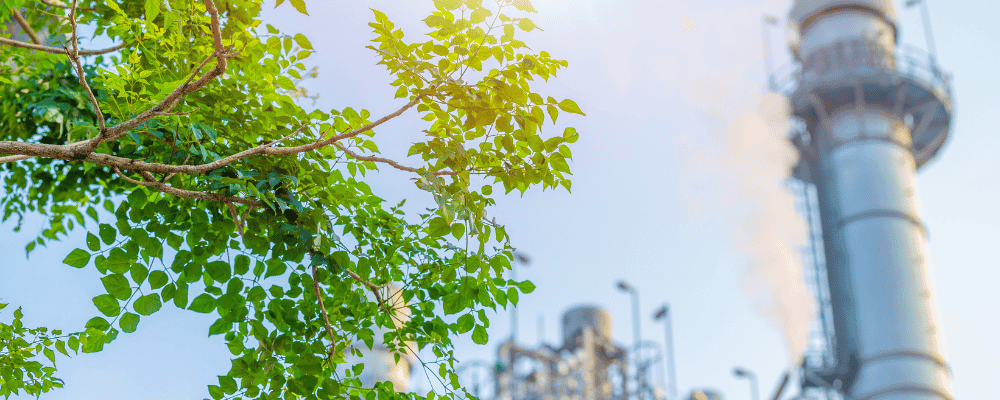
Pagbibigay ng Eco-Friendly Filtration Media Options
Ang Intensiv-Filter Himenviro ay nakatuon sa pagpapanatili sa pamamagitan ng pagbuo ng eco-friendly na filter na media na iniayon para sa iba't ibang pang-industriya na aplikasyon. Sa pamamagitan ng pagbibigay-priyoridad sa mga opsyon sa biodegradable at natural na hibla, tinitiyak ng Intensiv-Filter Himenviro ang epektibong pagganap ng pagsasala habang binabawasan ang pangmatagalang epekto sa kapaligiran na nauugnay sa pagtatapon. Ang pamamaraang ito ay nagpapahintulot sa mga industriya na mapanatili ang matataas na pamantayan sa kontrol ng kalidad ng hangin nang hindi nakompromiso ang kanilang mga layunin sa pagpapanatili.
Pagbuo ng Enerhiya-Efficient Filtration Designs
Nag-aalok ng Modular at Recyclable na Mga Bahagi ng Filtration
Sa matinding pagtuon sa mga recyclable na materyales at modular na disenyo, ang Intenv-Filter Himenviro ay nagtataguyod ng isang pabilog na ekonomiya sa loob ng industriya ng pagsasala ng hangin. Ang kanilang mga modular system ay nagbibigay-daan sa mga industriya na madaling palitan o i-upgrade ang mga partikular na bahagi, pagpapahaba ng buhay ng kagamitan at pagbabawas ng basura. Hindi lang pinapaliit ng diskarteng ito ang epekto sa kapaligiran ngunit sinusuportahan din ang mga napapanatiling kasanayan sa negosyo sa pamamagitan ng pagpapababa ng mga gastos sa pagpapalit.
Regenerative at Reusable Filtration Solutions
Bilang karagdagan sa pagbibigay ng de-kalidad na filter na media, ang Intensiv-Filter Himenviro ay nag-aalok ng regenerative at reusable filtration system. Sa pamamagitan ng pagsasama ng pulse-jet cleaning mechanism at iba pang regenerative na teknolohiya, tinitiyak nila na ang mga filter ay maaaring magamit muli nang maraming beses nang hindi nakompromiso ang kahusayan sa pagsasala. Ang napapanatiling kasanayan na ito ay makabuluhang binabawasan ang basura at mga gastos sa pagpapatakbo, na ginagawa itong isang mainam na pagpipilian para sa mga industriya na may patuloy na mga pangangailangan sa pagsasala.
Pagsuporta sa mga Kliyente sa Pagkamit ng Mga Layunin sa Pagpapanatili
Higit pa sa pagbibigay ng mga sustainable filtration solutions, ang Intensiv-Filter Himenviro ay malapit na nakikipagtulungan sa mga kliyente upang bumuo ng mga iniangkop na estratehiya para matugunan ang kanilang mga layunin sa pagpapanatili. Mula sa paunang disenyo ng system hanggang sa patuloy na pagpapanatili at suporta, ang Intenv-Filter Himenviro ay nagbibigay ng mga komprehensibong serbisyo na tumutulong sa mga industriya na sumunod sa mga regulasyon sa kapaligiran, bawasan ang basura, at pagbutihin ang kahusayan sa pagpapatakbo.
Mga Real-World na Application ng Sustainable Air Filtration Solutions
Paggawa ng Semento
Ang produksyon ng semento ay isa sa mga industriyang may pinakamalakas na paglabas, na gumagawa ng mga makabuluhang antas ng particulate matter, sulfur dioxide (SO₂), at mga nitrogen oxide (NOx). Ang mga multi-stage na solusyon sa pagsasala na matipid sa enerhiya ng Intensiv-Filter Himenviro ay mainam para sa mga plantang semento na naglalayong bawasan ang kanilang environmental footprint. Sa pamamagitan ng paggamit ng sustainable filter media at regenerative system, maaaring mabawasan ng mga tagagawa ng semento ang mga emisyon at mga gastos sa pagpapatakbo nang sabay-sabay.
Produksyon ng Bakal
Sa paggawa ng bakal, ang pamamahala ng mga emisyon tulad ng mga particle ng metal, acid gas, at VOC ay mahalaga. Tinitiyak ng eco-friendly na filter na media at recyclable na bahagi ng Intensiv-Filter Himenviro na ang mga pasilidad sa paggawa ng bakal ay makakasunod sa mahigpit na mga pamantayan sa kapaligiran nang hindi nagkakaroon ng mataas na gastos sa pagpapanatili.
Mga Waste-to-Energy Plants
Ang mga pasilidad ng basura-sa-enerhiya ay nahaharap sa hamon ng pagsala ng mga kumplikadong daluyan ng gas na may magkakaibang mga kontaminante. Ang mga multi-stage na solusyon sa pagsasala ng Itensiv-Filter Himenviro, na nagsasama ng mga ESP, scrubber, at mga filter ng tela, ay nag-aalok ng komprehensibong pag-alis ng kontaminant. Bukod pa rito, binabawasan ng mga disenyong matipid sa enerhiya ang mga gastos sa pagpapatakbo at sinusuportahan ang mga layunin ng pagpapanatili ng mga waste-to-energy na halaman.
Ang Kinabukasan ng Sustainable Air Filtration
Ang pagtulak tungo sa pagpapanatili sa pagsasala ng hangin ay nakakakuha ng momentum, na may mga pagsulong sa mga eco-friendly na materyales, mga disenyong matipid sa enerhiya, at mga recyclable na bahagi. Habang humihigpit ang mga regulasyon at lumalago ang kamalayan ng publiko, ang mga industriya ay lalong nagpapatibay ng mga napapanatiling kasanayan upang bawasan ang kanilang epekto sa kapaligiran.
Sa pamamagitan ng pangako nito sa pagbabago at pagpapanatili, ang Intensiv-Filter Himenviro ay nakahanda na pangunahan ang pagbabagong ito, na nagbibigay ng mataas na pagganap, responsable sa kapaligiran na mga solusyon sa pagsasala ng hangin. Sa pamamagitan ng pag-align sa mga global sustainability initiatives, sinusuportahan ng Intensiv-Filter Himenviro ang mga industriya sa pagkamit ng mas malinis, greener na mga operasyon, na nag-aambag sa isang mas malusog na planeta para sa mga susunod na henerasyon.
